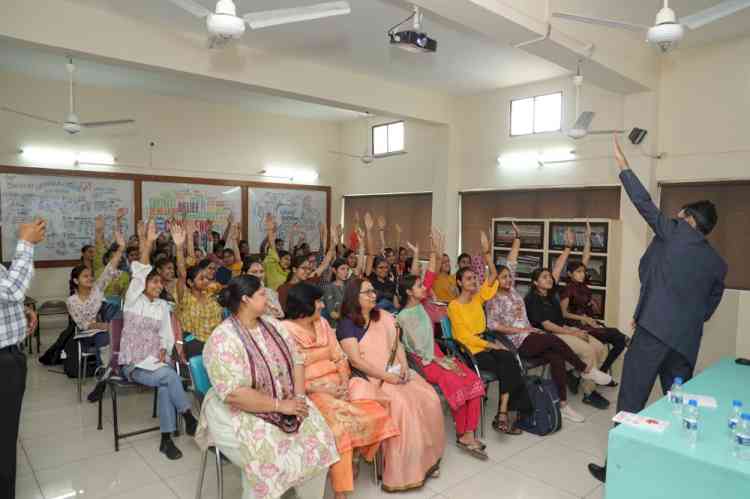Tech innovation will define future skill requirements of law students - BML Munjal School of Law and Vahura study
The study talks about Decoding the Next - Gen Legal Professional

Gurugram: BML Munjal University (BMU) School of Law and Vahura, a leading legal search and consulting firm today announced the findings of a first of its kind survey titled “Decoding the Next - Gen Legal Professional”. The study sets out to capture the practitioners’ perspective of the practice of law and to identify the relevant skills required of lawyers in the rapidly transforming legal environment in India. Commissioned by the BMU School of Law, the survey informs students who are seeking a career in Law with reliable information on the future of legal practice and the kind of skills required that employers value in today’s rapidly transforming legal profession. The survey also highlights the skills gap in legal education and serves as an industry reckoner to inform curriculum choices for law schools.
The survey report brings to the fore that the legal profession is in the midst of significant transformation. The changing client demands, rise of new generations with different career expectations, automation, and technological innovations such as AI will continue to accelerate a transformation in the legal profession. The survey findings showcase how lawyers see the practice of law changing in India over the next decade. A whopping 90 percent of all respondents say that the proliferation of digital and technology will be the most significant change that the sector will witness. Among other significant changes that the sector will witness, 64 percent of respondents cite increased competitiveness among law firms while 49 percent cite the growth in in-house legal resources by companies.
The findings state that the technology solutions in the legal space may replace some human roles at the entry-level by way of automating repetitive and standardized work but are expected to augment others such as reviewing documents more efficiently. Over 42 percent of all respondents said that they expect 20 percent of day to day tasks to be automated. In this scenario, lawyers would not only need to be up to date with the latest technological developments but need to develop and sharpen their skills in critical areas. The survey shortlists in order of importance the qualities that young lawyers should currently possess to be relevant and in demand. Research and analytics (94 percent) tops the charts, followed by attention to detail and a sharp eye for accuracy (93 percent), ability to work hard (71 percent), an openness to learn (72 percent) and oral and communication skills (88 percent).
With the disruption expected in the legal profession over the next decade catalysed by tech, the survey captures the skills that would be considered most important for lawyers to survive and thrive in the competitive legal industry over the next 3 to 5 years. The top skill required would be one of understanding and anticipating client needs (81 percent), followed by tech proficiency (74 percent), commercial awareness (71 percent) and time management (57 percent).
The survey also points to what lawyers and law firms would want in potential recruits. Most respondents, 76 percent say that Law Schools should have an emphasis on and provide students hands-on practical training in contract drafting, pleadings, and procedure and on building the fundamentals of law. 72 percent respondents cite the need to build skills in drafting and negotiation while 61 percent say that Law Schools should train students in legal tech to make them future ready.
The emphasis in the survey by most respondents is on skills that are important for lawyers to have and those that would be required among aspiring lawyers, while maintaining that there are enough schools to meet the market demand for lawyers. While 42 percent respondents felt that there are enough law schools to cater to the market demand for lawyers, 30 percent still believe that there is always a place for top-quality law schools in the future as well. Over 60 percent respondents believe that law schools in India are not keeping up with the changing environment. Interestingly, the top areas of training that law firms say they need to spend time and focus on with young lawyers are in time management, research skills, people and interpersonal skills, and business communication.
Sunil Kant Munjal, Chancellor, BML Munjal University said while launching the survey, “I congratulate both the teams on the initiative, the survey identifies the skill gap in legal education, a gap that the Law School at BML Munjal University would like to address by making experiential learning and personalised legal education the cornerstone of its pedagogy and curriculum. In the current scenario, law schools will play a critical role in nurturing and developing lawyers who are equipped with the skills and attitudes essential for modern legal practice. I am confident that these findings would interest both industry and students.”
“BML Munjal University seeks to transform education across disciplines by studying how various sectors are evolving, and integrating this knowledge within the curriculum; plus, the emphasis on hands-on practical training ensures that our students are ready for the real world. The School of Law assesses what the industry expects from the legal professional in terms of skills and behaviours required in the future and empowers students accordingly. Besides, with technology impacting the legal industry profoundly, the judgment sense of lawyers will become even more critical, hence our emphasis on developing soft attributes, such as emotional intelligence and communication skills. We try to equip our law graduates with four key qualities: to be persuasive, effective, innovative and empathetic, so they can become globally recognized practitioners and thought leaders,” said Prof. (Dr.) Nigam Nuggehalli, Dean, School of Law at BML Munjal University
Speaking about the report, Ritvik Lukose, CEO, Vahura said “From the outside, the legal ecosystem may appear to be stuck in a different century. This study however, shows that the legal community is acutely aware of the rapidly changing times, and as practitioners, educators and stakeholders, they are aware of the need to embrace technology and build new skill sets. The recent headlines around eCourts, online dispute resolution and legal tech are some of the more well-known examples of how significantly the practice of law is changing.”
The BML Munjal School of Law currently offers undergraduate integrated degree programs of B.A., LL.B. (Hons.) and B.B.A., LL.B. (Hons.). By design, these programs aim to develop a sense of curiosity amongst students to understand the finer nuances of law and to use this understanding in engaging with complex legal problems. The curriculum is designed in consultation with leading practitioners of law to ensure that its students are equipped with the latest knowledge and skills required to be job ready. The two programs offered at School of Law are in adherence with the latest Bar Council of India Rules and University Grants Commission Regulations. In addition, the varied electives available to the students also ensure that the professionals who emerge are truly innovative practitioners, capable of approaching law from a multi-disciplinary perspective of commerce, humanities, and technology.


 cityairnews
cityairnews 








